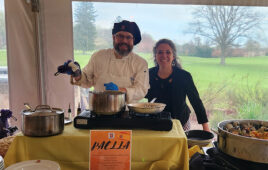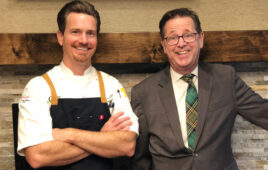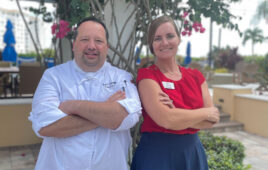A structured and ongoing server training program will increase member satisfaction and unify the F&B team.
When a member asks a question about where the featured fresh fish is from, a server should be able to answer that question, in detail, without having to leave the table to speak with the chef first.
But getting to this point is not as simple as connecting point A to point B.
A well-trained server can make or break a dining experience. So training these individuals is critical for continued success—and many clubs are investing more time and money into improving their training programs, and their people.

At Hammock Dunes Club in Palm Coast, Fla., Executive Chef Lance Cook takes advantage of daily pre-shift lineups to go over the restaurant’s nine nightly features. Cook reviews specifics for each feature, including which items require a temperature request, proper pronunciation of the dishes, and where all seafood items are harvested.
Cook also conducts a basic culinary review during pre-shift to discuss current menu items. Staff is given the opportunity to see and sample any items discussed, and to ask questions.
“Training is non-stop,” says Cook. “It is done every day with every team member, and used at every table.”
To bolster server knowledge, Hammock Dunes also hosts annual training seminars that offer structured and detailed two-day courses. During this time, group activities and training sessions help to perfect and refine service.

Colby Newman, Executive Chef, Grosse Pointe YC
Sharing in Cook’s strategy, Colby Newman, Executive Chef of Grosse Pointe Yacht Club in Grosse Pointe Shores, Mich., also offers the opportunity for the front-of-house team to see and sample new menu items.
“We make our FOH training interactive, and let the staff eat and ask questions,” he says. “This gives the front of the house a better understanding of presentations and flavor profiles. They also feel more connected to the process.”
For each menu item, Newman shares a story about its sourcing or seasonality, so the servers can draw on that knowledge to provide an added, personalized touch.
“Servers need to know the menus, but they also need to be able to sell the dish,” says Newman. “Our FOH training instills knowledge about the menu, ingredients and food allergens, but it also tells the ‘story’ of the ingredients.”
Just down the road from Newman at the Country Club of Detroit (CCD) in Grosse Pointe Farms, Mich., Clubhouse Manager Bryan Sandzik stresses the importance of menu knowledge to his team regularly. Sandzik takes a proactive approach by distributing weekly features ahead of time, to allow his team to review menu items and come up with questions.
On the first day of service, CCD’s back-of-house team will cook and explain each feature item for the front-of-house staff to see, taste and learn about. “Knowledge is powerful stuff,” says Sandzik.
At CCD, service standards are exact and are reviewed frequently. Teamwork and discipline are both emphasized.
“Creating a friendly and inviting environment for your members and guests is number one for us,” says Sandzik.
“The goal is the pursuit of perfection,” adds CCD’s F&B Manager, Chad Bryson. “We achieve this by utilizing every individual’s strengths.”
CCD hosts daily, weekly and even annual training meetings. During this time, staff members are given training packets to review one-on-one with their managers. Much of the content in these packets is gleaned from the nightly service reports collected by Sandzik. This helps the team to see what’s working and what’s not, so their service skills can continue to evolve.
Helping Hands
Success for CCD’s training program is dependent on more than F&B and Clubhouse Managers.
“Front-of-house training is the responsibility of all FOH management and even the veteran servers of the club,” says Bryson.
Shadowing is especially helpful for both CCD and Grosse Pointe YC.
“Training is best learned by doing and understanding the whole process,” says Newman. “A new server will spend several shifts shadowing a veteran server to better understand the nuances of the club, the food and the membership.”
Regardless of what the term might imply, front-of-the-house training is really an all-hands-on-deck task. No matter what part(s) of the house is involved, the training should unify an operation and elevate each club’s ability to serve and satisfy its members.




